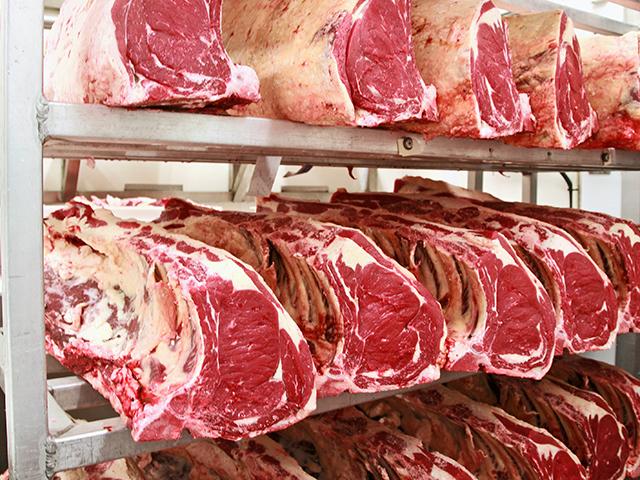DTN Ag Policy Blog
USDA Finalizes New Product of USA Labeling Rule for Meat, Poultry and Eggs
USDA is finalizing a new rule on "Product of USA," labeling for meat, poultry and eggs that will limit the voluntary retail label only to products from animals "born, raised, slaughtered and processed in the U.S.
Agriculture Secretary Tom Vilsack announced the near rule at the National Farmers Union annual convention on Monday in Scottsdale, Ariz.
USDA's final "Product of USA" rule allows the voluntary "Product of USA" or "Made in the USA" label claim to be used on meat, poultry and egg products only when they are derived from animals born, raised, slaughtered and processed in the United States. The rule willâ?¯prohibit misleading U.S. origin labeling in the market and help ensure that the information that consumers receive about where their food comes from is truthful, USDA stated.
Vilsack noted that the proposed labeling rule received more than 3,300 comments. He also said packers will not be allowed to get around the rule with misleading stickers, saying packers "can't slap an American flag on the package.
Under the final rule, the "Product of USA" or "Made in the USA" label claim will continue to be voluntary. It will also remain eligible for generic label approval, meaning it would not need to be pre-approved by USDA's Food Safety and Inspection Service (FSIS) before it can be used on regulated product, but would require the establishment to maintain documentation on file to support the claim. The final rule also allows the use of other voluntary U.S. origin claims on meat, poultry and egg products sold in the marketplace. These claims will need to include a description on the package of the preparation and processing steps that occurred in the United States upon which the claim is made.
Packers voluntarily using a claim subject to the final rule will need to comply with the new regulatory requirements by January 1, 2026, and are encouraged to do so as soon as practicable after the publication of this final rule.
P[L1] D[0x0] M[300x250] OOP[F] ADUNIT[] T[]
The voluntary label is already causing consternation by Canada's livestock industry. In an article on Canada's realagriculture.com, groups raised questions about the voluntary rule. Canada last year exported $3.45 billion CAN ($2.65 billion in U.S. values) in beef to the U.S., which is larger than all other Canadian export markets combined.
"There are some things that both raise and lower the temperature in my mind," said Lauren Martin, senior director, government relations and policy with the Canadian Meat Council. "The thing that lowers the temperature is that it's quote-unquote voluntary. Okay, so that's better than the mandatory COOL that came before. But what is worse is that this proposed rule could be more expansive," Martin says. "It applies to livestock that is born, raised and slaughtered in the U.S., which is, in fact, wider, broader than the rule in 2015."
Canada also exports roughly 6.5 million hogs to the U.S. as well. The vast majority of those hogs are feeder pigs that are finished by U.S. pork producers.
Realagriculture.com also noted Canada's Minister of Agriculture Lawrence MacAulay and Minister of Trade Mary Ng also released a statement last week that they are concerned about the rule disrupting the North American livestock supply chains.
"Canada will closely review the proposed amendments to the labeling of meat, poultry and egg products in the U.S. and will participate in the U.S. rule-making process to ensure that these changes conform to the U.S.' international trade obligations and do not disrupt supply chains," the ministers stated.
It should be noted that Canada has a voluntary meat labeling program in which Canadian packers market "100% Canadian beef" to consumers.
FARMER SEED LIAISON INITIATIVE
Vilsack on Monday also detailed new actions on transparency to ensure seed companies are following the Federal Seed Act.
Vilsack said USDA will hire specialists to monitor websites for seed companies to ensure what they state complies with the Federal Seed Act. That includes checking pamphlets and PDFs "and we'll call out circumstances where the Federal Seed Act is not being complied with," Vilsack told NFU members.
In a news release, USDA stated, "These efforts are the next steps in USDA's initiative to boost variety transparency to the farmer at the point of sale and follow on the letters that USDA sent to the executives of the largest seed companies in November. Additionally, USDA will increase outreach efforts, including a webinar to further educate producers about labeling requirements and participation in industry meetings. The agency produced a similar webinar with the American Seed Trade Association."
Chris Clayton can be reached at Chris.Clayton@dtn.com
Follow him on X, formerly known as Twitter, @ChrisClaytonDTN
(c) Copyright 2024 DTN, LLC. All rights reserved.



